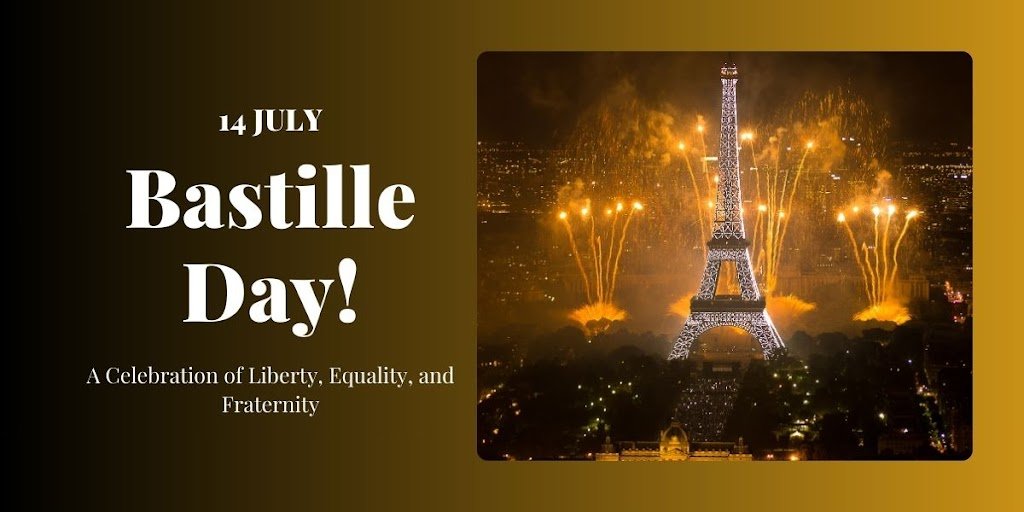Bastille Day in French, known as “La Fête Nationale” or “Le 14 Juillet,” is an iconic holiday celebrated on the 14th of July each year. This day marks the anniversary of the storming of the Bastille prison in 1789, a pivotal event in the French Revolution that symbolized the end of absolute monarchy and the birth of the French Republic. In this comprehensive blog, we will explore the rich history, traditions, and cultural significance of Bastille Day in French, weaving in human stories and the essence of French patriotism that makes this day so special.
The Historical Significance of Bastille Day in French
One must delve into its historical roots to truly appreciate Bastille Day in France. The storming of the Bastille on July 14, 1789, was not just an attack on a prison but a powerful statement against the tyranny of the Bourbon monarchy. The Bastille symbolized the king’s absolute power, and its fall marked the rise of the common people and their fight for liberty, equality, and fraternity.
The French Revolution, which began with this event, fundamentally changed the course of French and world history. It led to the establishment of a republic, the drafting of the Declaration of the Rights of Man and the Citizen, and the eventual rise of Napoleon Bonaparte. Bastille Day in French is thus a celebration of these revolutionary ideals and the enduring spirit of the French people.
Celebrations and Traditions of Bastille Day in French
Bastille Day in France is celebrated with great enthusiasm and a variety of traditions that reflect the nation’s pride and joy. The festivities begin with the oldest and largest military parade in Europe, held on the Champs-Élysées in Paris. This grand parade showcases the strength and unity of the French armed forces, and it is attended by the President of France, government officials, and foreign dignitaries.
In addition to the parade, the day is marked by a plethora of public events, including fireworks, concerts, and parties. The most iconic of these is the spectacular fireworks display at the Eiffel Tower, which illuminates the Parisian sky in a dazzling array of colors. Across the country, cities and towns host their celebrations, from communal meals to lively dances known as “bals des pompiers” or firefighters’ balls.
The Human Touch: Personal Stories of Bastille Day in French
Bastille Day in French is not just about grand parades and fireworks; it is also a deeply personal and emotional day for many French citizens. For example, for Jean-Pierre, a retired teacher from Marseille, Bastille Day is a time to remember his ancestors who fought in the Revolution.
Marie, a young artist from Lyon, sees Bastille Day as an opportunity to celebrate French culture and creativity.
Bastille Day in French Communities Abroad
The celebration of Bastille Day in French is not confined to France alone. French communities around the world, from New York to Sydney, mark the day with their festivities. These celebrations often include French food, music, and cultural displays, creating a sense of connection and unity among the French diaspora.
In New York City, for instance, the annual Bastille Day in French street fair on 60th Street is a major event. Thousands of people gather to enjoy French cuisine, wine, and entertainment, highlighting the global appeal of French culture. Similarly, in Sydney, the French community celebrates with a French-themed market and performances, bringing a slice of France to Australia.
The Culinary Delights of Bastille Day in French
No celebration of Bastille Day in French would be complete without indulging in the country’s renowned culinary delights. From traditional dishes like coq au vin and ratatouille to mouth-watering pastries such as éclairs and macarons, the day is a feast for the senses. Many French families take this opportunity to gather for a special meal, enjoying the flavors of their heritage.
Local markets and food festivals also play a significant role in the celebrations. In cities like Bordeaux and Lyon, food stalls line the streets, offering a variety of regional specialties. Visitors can sample everything from fine cheeses and charcuterie to fresh seafood and artisanal bread, experiencing the richness of French gastronomy.
Bastille Day in French Arts and Media
The influence of Bastille Day in Franch extends beyond the festivities into arts and media. French cinema, literature, and music often reflect the themes of liberty, equality, and fraternity, inspired by the revolution. Films such as “Les Misérables” and “The Scarlet Pimpernel” capture the drama and heroism of the period, while Victor Hugo’s works provide a literary exploration of the social changes sparked by the revolution.
Music also plays a vital role in the celebrations, with the “Marseillaise” (the French national anthem) being sung with pride. Contemporary artists and musicians contribute to the festive atmosphere with performances that blend traditional and modern styles, showcasing the dynamic nature of French culture.
The Future of Bastille Day in French
As France continues to evolve, so does the celebration of Bastille Day in French. The day remains a powerful symbol of national unity and pride, but it also reflects the changing social and political landscape. Issues such as immigration, diversity, and globalization influence how the day is celebrated and perceived.
For younger generations, Bastille Day in French is an opportunity to engage with their history and identity in new ways. Social media and digital platforms have become integral to the celebrations, allowing people to share their experiences and connect with others worldwide. This blending of tradition and modernity ensures that Bastille Day remains relevant and meaningful for all French citizens.
French Republic Day – Conclusion
Bastille Day in French is more than just a national holiday; it is a celebration of the values that define France. From the historic storming of the Bastille to the vibrant festivities of today, the day embodies the spirit of liberty, equality, and fraternity. Through parades, personal stories, culinary delights, and cultural expressions, Bastille Day in French continues to inspire and unite people across the globe. As we look to the future, this cherished tradition will undoubtedly continue to evolve, reflecting the dynamic and resilient nature of the French nation.



